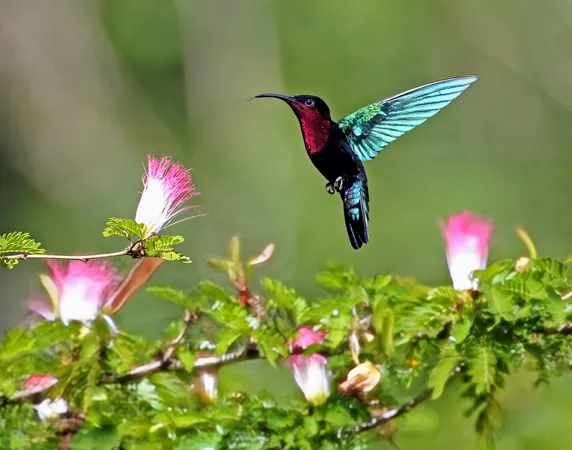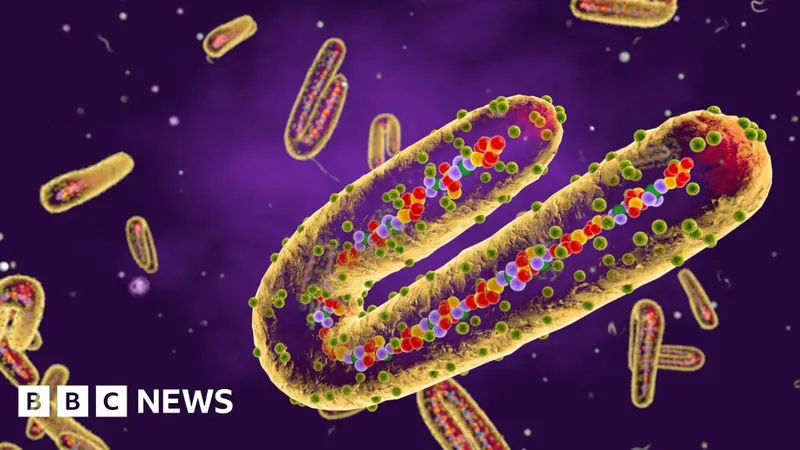
Surprising Resilience of Ecosystems After Natural Disasters Revealed
2024-10-12
Author: Ming
Surprising Resilience of Ecosystems After Natural Disasters Revealed
In a groundbreaking study, researchers have uncovered that ecosystems are more adaptable and resilient than previously believed following natural disasters. This revelation comes from a detailed examination of plant-pollinator relationships on the Caribbean island of Dominica in the wake of Hurricane Maria, a catastrophic Category 5 storm that struck in 2017.
Plant-Pollinator Dynamics Under Siege
The study focuses on a particularly intricate relationship between two species of heliconia plants—Heliconia bihai and H. caribaea—and their primary pollinator, the purple-throated carib hummingbird (Eulampis jugularis). Typically, these heliconia flowers have evolved to rely exclusively on this hummingbird for pollination, making the plants particularly vulnerable to the loss of their key pollinator.
When Hurricane Maria decimated Dominica, it resulted in a staggering loss of 75% of the E. jugularis population, raising fears that the heliconia species could face extinction without their main pollinator. However, a new study, published in the journal New Phytologist, has provided unexpected optimism.
Unexpected Pollinators Step In
Researchers led by Dr. Fernando Gonçalves from the Center for Research on Biodiversity Dynamics and Climate Change have documented that other bird species, including additional hummingbirds and the Bananaquit (Coereba flaveola), have taken on pollination duties, visiting heliconia flowers at rates equal to or even surpassing those of E. jugularis. Gonçalves noted, "The decline of the E. jugularis population allowed other bird species to emerge as effective pollinators, indicating the surprising resilience of the ecosystem."
Through extensive fieldwork in 2022, the team analyzed visitation rates, pollen deposition, and the overall dynamics of this complex ecological network. The researchers employed mist nets to capture birds and specialized equipment to sample pollen from their beaks and feathers, confirming that the ecosystem was able to adapt after a major disturbance.
Shifting Dominance and Ecosystem Complexity
Gonçalves explained that the previously dominant territorial behavior of E. jugularis restricted access to heliconia plants for other birds. However, with their numbers drastically reduced, competition diminished, allowing the Bananaquit and other hummingbirds to flourish as pollinators. This represents a significant shift in the ecological balance, highlighting that ecosystems can recover and reorganize after turmoil.
The findings flesh out a critical understanding: ecosystems are not only vulnerable but also remarkably capable of redistributing roles among species post-disaster. The ability of various birds to step into the shoes of E. jugularis suggests a more intricate web of interactions than previously acknowledged, challenging long-standing assumptions about specificity in mutualistic relationships.
Looking Forward: What Comes Next?
The authors of the study propose that, barring further catastrophic events, the heliconia species and their original pollinator may reestablish their exclusivity in the coming decades, potentially 15 to 20 years from now. Gonçalves and his team remain committed to ongoing research on Dominica to explore how natural disturbances influence evolutionary behavior in different species.
This research underscores crucial insights into the adaptability and resilience of ecosystems, providing a clearer picture of how species interactions adapt in the face of environmental change—from natural disasters to ongoing climate shifts. In an era when extreme weather events seem increasingly prevalent, understanding these dynamics is essential not just for conservation efforts but for predicting the future of biodiversity in a changing world.
As climate challenges intensify, studies like these remind us that nature possesses remarkable resilience, opening avenues for hope amidst escalating ecological crises.
Want to keep up with the latest in ecological research? Subscribe to our newsletter for exclusive insights and updates!



 Brasil (PT)
Brasil (PT)
 Canada (EN)
Canada (EN)
 Chile (ES)
Chile (ES)
 España (ES)
España (ES)
 France (FR)
France (FR)
 Hong Kong (EN)
Hong Kong (EN)
 Italia (IT)
Italia (IT)
 日本 (JA)
日本 (JA)
 Magyarország (HU)
Magyarország (HU)
 Norge (NO)
Norge (NO)
 Polska (PL)
Polska (PL)
 Schweiz (DE)
Schweiz (DE)
 Singapore (EN)
Singapore (EN)
 Sverige (SV)
Sverige (SV)
 Suomi (FI)
Suomi (FI)
 Türkiye (TR)
Türkiye (TR)